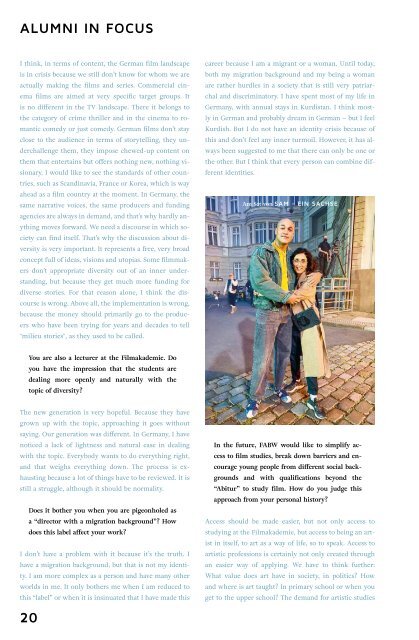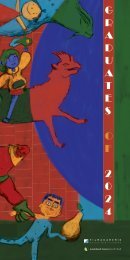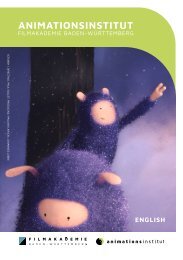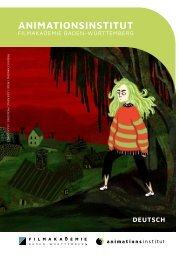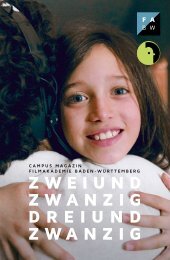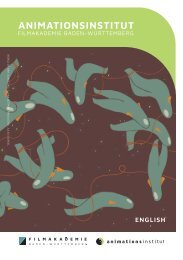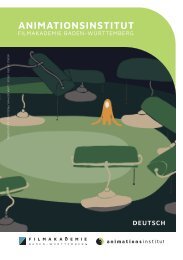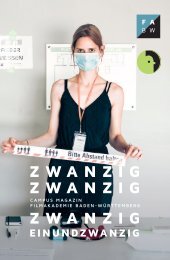Filmakademie Baden-Württemberg Campus Magazin 23/24
Erfolgreiche ePaper selbst erstellen
Machen Sie aus Ihren PDF Publikationen ein blätterbares Flipbook mit unserer einzigartigen Google optimierten e-Paper Software.
ALUMNI IN FOCUS<br />
I think, in terms of content, the German film landscape<br />
is in crisis because we still don’t know for whom we are<br />
actually making the films and series. Commercial cinema<br />
films are aimed at very specific target groups. It<br />
is no different in the TV landscape. There it belongs to<br />
the category of crime thriller and in the cinema to romantic<br />
comedy or just comedy. German films don’t stay<br />
close to the audience in terms of storytelling, they underchallenge<br />
them, they impose chewed-up content on<br />
them that entertains but offers nothing new, nothing visionary.<br />
I would like to see the standards of other countries,<br />
such as Scandinavia, France or Korea, which is way<br />
ahead as a film country at the moment. In Germany, the<br />
same narrative voices, the same producers and funding<br />
agencies are always in demand, and that’s why hardly anything<br />
moves forward. We need a discourse in which society<br />
can find itself. That’s why the discussion about diversity<br />
is very important. It represents a free, very broad<br />
concept full of ideas, visions and utopias. Some filmmakers<br />
don’t appropriate diversity out of an inner understanding,<br />
but because they get much more funding for<br />
diverse stories. For that reason alone, I think the discourse<br />
is wrong. Above all, the implementation is wrong,<br />
because the money should primarily go to the producers<br />
who have been trying for years and decades to tell<br />
"milieu stories", as they used to be called.<br />
career because I am a migrant or a woman. Until today,<br />
both my migration background and my being a woman<br />
are rather hurdles in a society that is still very patriarchal<br />
and discriminatory. I have spent most of my life in<br />
Germany, with annual stays in Kurdistan. I think mostly<br />
in German and probably dream in German – but I feel<br />
Kurdish. But I do not have an identity crisis because of<br />
this and don’t feel any inner turmoil. However, it has always<br />
been suggested to me that there can only be one or<br />
the other. But I think that every person can combine different<br />
identities.<br />
Am Set von SAM - EIN SACHSE<br />
You are also a lecturer at the <strong>Filmakademie</strong>. Do<br />
you have the impression that the students are<br />
dealing more openly and naturally with the<br />
topic of diversity?<br />
The new generation is very hopeful. Because they have<br />
grown up with the topic, approaching it goes without<br />
saying. Our generation was different. In Germany, I have<br />
noticed a lack of lightness and natural ease in dealing<br />
with the topic. Everybody wants to do everything right,<br />
and that weighs everything down. The process is exhausting<br />
because a lot of things have to be reviewed. It is<br />
still a struggle, although it should be normality.<br />
Does it bother you when you are pigeonholed as<br />
a “director with a migration background”? How<br />
does this label affect your work?<br />
I don’t have a problem with it because it’s the truth. I<br />
have a migration background, but that is not my identity.<br />
I am more complex as a person and have many other<br />
worlds in me. It only bothers me when I am reduced to<br />
this “label” or when it is insinuated that I have made this<br />
20<br />
In the future, FABW would like to simplify access<br />
to film studies, break down barriers and encourage<br />
young people from different social backgrounds<br />
and with qualifications beyond the<br />
“Abitur” to study film. How do you judge this<br />
approach from your personal history?<br />
Access should be made easier, but not only access to<br />
studying at the <strong>Filmakademie</strong>, but access to being an artist<br />
in itself, to art as a way of life, so to speak. Access to<br />
artistic professions is certainly not only created through<br />
an easier way of applying. We have to think further:<br />
What value does art have in society, in politics? How<br />
and where is art taught? In primary school or when you<br />
get to the upper school? The demand for artistic studies


